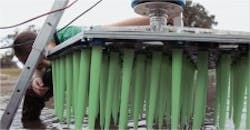ecoSPEARS to deploy clean water technology in Sweden
ORLANDO, FL -- ecoSPEARS and its Swedish partners Umeå University (UMU) and SWECO, have been awarded a grant to deploy ecoSPEARS' namesake NASA-developed clean water technology to extract persistent toxins from Sweden's waterways. The grant will fund the Sorbent Polymer Extraction And Remediation System (SPEARS) deployment as part of the Swedish Geotechnical Institute's (SGI) TUFFO program to research the impact of technology within contaminated areas of Sweden.
"We are extremely proud of being awarded this project from SGI," said Serg Albino, ecoSPEARS CEO and Co-founder. "Our partners at UMU and SWECO are focused on finding and deploying sustainable environmental technologies, such as SPEARS, to remediate toxins from waterways without causing potential harm to aquatic habitats and communities."
SPEARS is an innovative technology that absorbs PCBs and other persistent toxins, "like a sponge", from sediment in a safe and environmentally-friendly manner. SPEARS is a scalable mat-liner of plastic spikes filled with a proprietary reagent. They are deployed down into contaminated sediment or around challenging areas such as piers, harbors, or sensitive wetland areas where dredging may not be feasible. A key differentiator between SPEARS and environmental dredging is that SPEARS does not damage the aquatic habitat nor resuspend contaminants.
"Deploying SPEARS in Sweden is a key milestone not only for ecoSPEARS but the Swedish EPA as well as the European Union's environmental initiatives," said Ian Doromal, ecoSPEARS Executive Vice President and Co-founder.
ecoSPEARS and partners will be conducting the project over three years (2020-2023) to evaluate the technology for sediment remediation. UMU will assist primarily in data evaluation and analysis, with SWECO and SGI reporting the data findings to SPEA before disseminating them for public consumption. The project aims to permanently remove environmental toxins from impacted shorelines in Sweden to improve the health of the fish and unlock potential value related to land use. Sweden researchers will also study the cost of implementing the technology, investigate the risk of microplastics, and impact on the environment.
"In our project, we will evaluate the applicability of the SPEARS method to Swedish sediments and temperature conditions by conducting experiments in both lab-scale and in the field," says UMU's Stina Jansson. "Among other things, we want to see how the method works on a wider selection of environmental pollutants and how the levels of organic matter in the sediment affect the purification."
The SPEARS deployment in Sweden will assist ecoSPEARS, UMU, and SEPA in laying the groundwork for implementing SPEARS on a larger scale in Sweden in the future.
